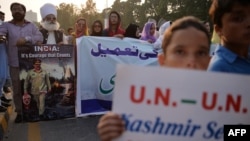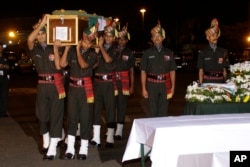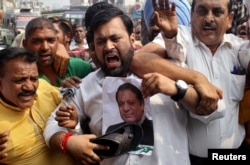India announced Tuesday that Prime Minister Narendra Modi will not attend a regional summit to be held in Islamabad in November because of increasing cross-border attacks in the region.
The decision was announced days after Modi said that he will mount a global campaign to diplomatically isolate Pakistan in the wake of a terror attack on an Indian army base in Kashmir that killed 18 soldiers.
Tensions between the two countries have spiked after India blamed the attack on Pakistan-based militants. Islamabad has denied any role in the assault, and said it could be a reaction to the situation in Indian Kashmir, which has been wracked with widespread civilian unrest since July.
In a statement, the foreign ministry said that "increasing cross-border attacks in the region and growing interference in the internal affairs of the member states have created an environment that is not conducive to the successful hosting of the SAARC [South Asian Association of Regional Cooperation] summit."
Other countries’ concerns
Without elaborating, the statement said that other countries have also conveyed their reservations about attending the South Asian gathering.
They are believed to be Afghanistan and Bangladesh, which also blame Pakistan for supporting terror groups. Neither country has publicly disclosed such reservations.
SAARC includes India, Pakistan, Bangladesh, Nepal, Bhutan, Sri Lanka, Afghanistan and the Maldives.
Modi's decision to stay away from the South Asian meet came a day after India's Foreign Minister Sushma Swaraj told the U.N. General Assembly in New York it is time to identify nations that "nurture, peddle and export terrorism."
She said Pakistan believes terrorist attacks will allow it to gain territory it covets in Kashmir. "My firm advice to Pakistan is: Abandon this dream. Let me state unequivocally that Jammu and Kashmir is an integral part of India and will always remain so," Swaraj said.
‘Litany of falsehoods’
In a sharp response to the Indian foreign minister, Pakistan's envoy to the United Nations, Maleeha Lodhi, called the Indian allegations a "litany of falsehoods" and said Kashmir was an "internationally recognized dispute."
Lodhi said the attack on the Indian army base had all the hallmarks of an operation designed to divert attention from "India's atrocities" in Kashmir.
While New Delhi accuses Pakistan of backing and supporting militant groups that mount terror strikes in India, Islamabad holds India responsible for human rights violations in Kashmir, the Himalayan territory divided between them and claimed by both. About 80 civilians have been killed since July in the largest anti-India protests in recent years.
On Tuesday, India also summoned Pakistani High Commissioner Abdul Basit in New Delhi for the second time in less than a week and presented him with what it said was proof of Pakistan's involvement in the militant strike on an Indian army base in Kashmir that killed 18 soldiers.
India's foreign ministry said it gave the Pakistani diplomat details on two "handlers" of the four militants who attacked the army base. Officials say the "handlers," who are in Indian custody, and one of the militants killed in the attack were from Muzaffarabad in Pakistani Kashmir.
Regional isolation is one among a range of retaliatory measures New Delhi has been weighing against Islamabad.
Water exploitation
On Thursday, Modi is due to hold a meeting to review the Most Favored Nation status that New Delhi has granted to Pakistan.
Indian officials have suggested they are also exploring ways in which New Delhi can increase the exploitation of water from three Himalayan rivers that flow into Pakistan. India has a right to use roughly 20 percent of the water under a 1960 pact, but says it has not done so.
New Delhi says there is no plan to scrap the treaty, but it will see how it can utilize more water allowed under its terms.
Such a move could further heighten tensions between the two countries. The waters of the three rivers are crucial for Pakistan.














